Israel Open To 'Good' Iran Nuclear Deal, But Tougher Vienna Terms
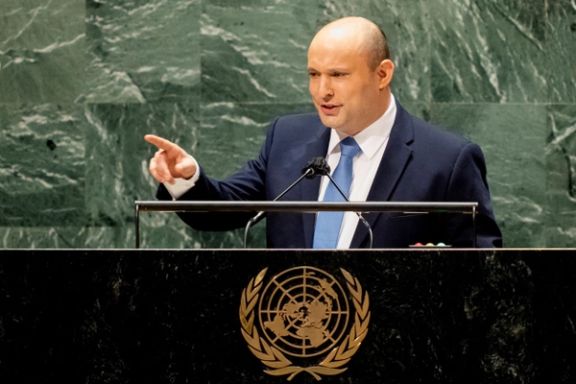
Prime Minister Naftali Bennett said on Tuesday that Israel would not automatically oppose a nuclear deal with Iran but world powers must take a firmer position.

Prime Minister Naftali Bennett said on Tuesday that Israel would not automatically oppose a nuclear deal with Iran but world powers must take a firmer position.
"We are not the bear who said 'no'," Bennett said in an interview with Israel's Army Radio, referring to a popular naysaying character from children's literature.
Israel prefers a more result-oriented approach, he said.
"For sure there can be a good agreement. For sure. We know the parameters. Is that expected to happen now in the current dynamics? No. Because there needs to be a much firmer position," he said.
"Iran is negotiating with a very weak hand. But unfortunately, the world is acting like Iran is at a strong point."
Bennett declined to comment on Israel's military strike capabilities against Iran, saying he preferred the approach of "speak little and do a lot".
On Monday, Iran and the United States resumed indirect talks in Vienna on salvaging the 2015 Iran nuclear deal with Iran focused on one side of the original bargain, lifting sanctions against it, despite what critics see as scant progress on reining in its atomic activities.
Report by Reuters

European Union represnetative at Iran nuclear talks, Enrique Mora, spoke Monday of “weeks not months” to agree over reviving the 2015 agreement, the JCPOA.
Russia’s top negotiator, Mikhail Ulyanov said negotiators would intensify the “drafting process” of an agreement.
Mora chairs formal meetings in Vienna, which Monday began an eight round in attempts to restore the 2015 agreement, the JCPOA (Joint Comprehensive Plan of Action). Mora also coordinates with the United States, which takes part in Vienna indirectly after leaving the JCPOA in 2018.
Mora told a news conference the process was focused on “both tracks in parallel,” referring to the central challenge dogging the talks since they began last April – that of agreeing which US sanctions contravene the JCPOA and how Iran’s nuclear program should be brought back within JCPOA limits.
"We are working on both tracks in parallel,” Mora said. “We are not working on one side and forgetting or neglecting the other. On the contrary, both tracks are mutually reinforcing.”
Mora expressed optimism that "if we work hard in the days and weeks ahead, we should have a positive result.” But he added: “I will not speculate on target dates to reach agreement, [but] we are talking about weeks not months to reach an agreement.”
‘Business-like discussions’
After a formal meeting of the JCPOA Joint Commission Monday, in which the US does not participate, Mikhail Ulyanov, Russia’s ambassador to the International Atomic Energy Agency (IAEA) and leading Moscow’s team ream in the talks, said participants had “held business-like and result-oriented discussions.”
China’s IAEA ambassador Wang Qun had said earlier in the day, before formal talks began, that there was “a greater sense of urgency of the part of all parties.”
Ulyanov said the JCPOA signatories had “in particular…agreed to intensify the drafting process in order to achieve an agreement as soon as possible.” Restoration of the 2015 agreement would require an agreed plan to sequence steps taken by both Tehran and Washington.
While US officials have drawn attention to Iran’s expanding atomic program – particularly with enrichment far beyond the 3.67 purity allowed under the JCPOA – Tehran has emphasized both the removal of American sanctions and the need for assurances that Washington would not renege on a renewed JCPOA.
Focus for Tuesday
Ali Bagheri-Kani, Iran’s lead negotiator in Vienna, said after the JCPOA Commission meeting that he expected discussion on Tuesday to focus on Tehran’s proposals for verification of the lifting of sanctions, with expert groups looking in particular at US measures aimed at Iran’s banking sector that have restricted Iran’s ability since 2018 to sell oil and repatriate the proceeds.
A seventh round of the Vienna talks, the first since new Iranian president Ebrahim Raisi (Raeesi) took office in August, ended ten days ago after Iran presented written proposals, which some suggested undid understandings reached before talks were suspended in June for Iran’s presidential election.
Mora said he had decided to reconvene talks today, between Christmas and New Year, so as not to lose time. But he said that there would be another break for three days as of Friday "because the facilities will not be available” in the boutique hotel where the main meetings take place. The five-star 19th-century Palais Coburg was also the venue for the signing of the JCPOA in 2015.
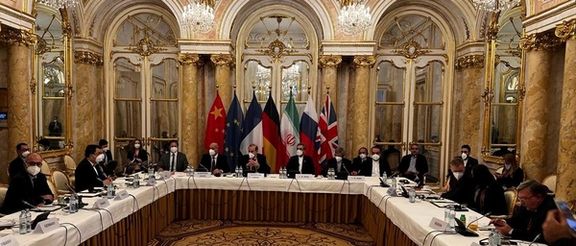
Diplomats from Iran and world powers have started the eighth round of talks in Vienna to revive the 2015 nuclear agreement (JCPOA).
The new round of the JCPOA Joint Commission is underway behind closed doors at the Palais Coburg on Monday evening. The commission is comprised of diplomats from Russia, China, Germany, Britain, France and Iran plus a European Union representative, the signatories to the agreement, which the United States left in 2018.
Minutes before leaving for the hotel, Iran’s top negotiator Ali Bagheri-Kani expressed hope about the results of the talks, saying that he is optimistic about this leg of the negotiations.
Before the official start of talks, Bagheri-Kani had meetings with the heads of Russian and Chinese delegations as well as one with EU coordinator Enrique Mora. Other participants also held meetings in various smaller formats.
Bagheri-Kani also met with the French representative after about a week of harsh rhetoric by Iranian media about France sabotaging the talks.
Iran's foreign minister had earlier criticized Paris for taking "unconstructive" stances in the talks.
"Today all parties have agreed to come back to activate the eighth round of negotiations even in Christmas and New Year's holiday. This in itself fully shows a greater sense of urgency on the part of all parties concerned," China's top envoy Wang Qun told reporters before the talks start.
The parties will discuss US sanctions-lifting and Iran's atomic commitments in parallel despite comments by Tehran and Beijing suggesting sanctions would be the focus, the talks' coordinator said.
"We are working on both tracks in parallel ... We are not working on one side and forgetting or neglecting the other. On the contrary, both tracks are mutually reinforcing," European Union envoy Enrique Mora, the talks' coordinator, told a news conference.
Russian envoy Mikhail Ulyanov twitted, “We discussed possible ways ahead at presumably final round of negotiations on restoration of the JCPOA” after a meeting with the EU coordinator.
Ulyanov also said, "This morning the delegations of Russia, China and Iran met to compare notes” before the official start of the 8th round of the plenary meeting.
Iranian and US officials don’t meet face-to-face, so other parties must shuttle between the two sides.
The seventh round of talks, the first under the administration of President Ebrahim Raisi, wrapped up 10 days ago with some new Iranian demands added to a working draft. The progress seemed to be too slow while the Western powers said negotiators had "weeks not months" left before the 2015 deal becomes meaningless.
Formally, the three European states, known as the ‘E3,’ have called on the US to withdraw sanctions incompatible with the JCPOA, and they have urged Iran to return its nuclear program, expanded since 2019, to JCPOA limits.
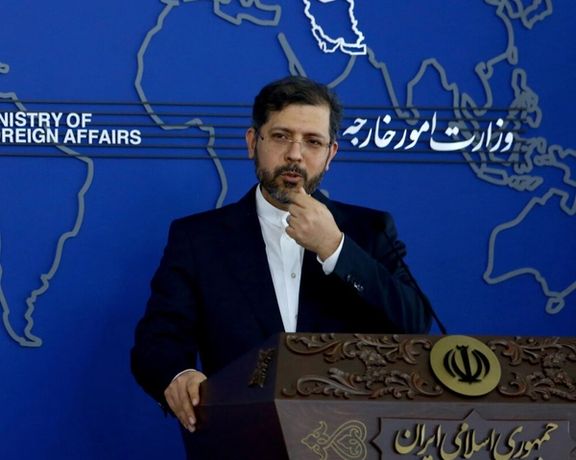
Iran has called on the three western European states to enter resumed Vienna nuclear talks with a focus on reaching agreement as quickly as possible.
In his weekly reporters’ briefing Monday, Iranian Foreign Ministry spokesman Saeed Khatibzadeh said Iran could not tolerate participants in Vienna wasting time by making demands beyond the 2015 nuclear agreement, the JCPOA (Joint Comprehensive Plan of Action).
Khatibzadeh also dismissed recent warnings by the United States and its European allies that time was running out to revive the Joint Comprehensive Plan of Action, JCPOA. He said Tehran will not be moved by “manufactured deadlines”.
Khatibzadeh said talks should focus on the new draft of two documents discussed during the latest round of talks, one on the nuclear issues and one on the verifiable removal of sanctions.
The spokesman called on participants to “appreciate this window of opportunity” and agree during the current round of talks on how to revive the JCPOA, which the United States left in 2018.
The talks are formally between remaining JCPOA members – China, France, Germany, Iran, Russia, and the United Kingdom – with the US taking part indirectly. Formally, the three western European states, known as the ‘E3,’ have called on the US to withdraw sanctions incompatible with the JCPOA and on Iran to return its nuclear program, expanded since 2019, to JCPOA limits.
Khatibzadeh said Iran was exchanging texts with the US delegation through Enrique Mora, the senior European Union official coordinating the Vienna process. This was important, the spokesman said, to establish procedures lifting US sanctions imposed since 2018, and precluding the US once again leaving the JCPOA once it rejoined.
Khatibzadeh echoed remarks by other Iranian officials that Iran needed guarantees from Washington that it would receive the benefits of the agreement.
Earlier in the day, Iran’s Foreign Minister Hossein Amir-Abdollahian said the current round of talks would discuss a new document "mutually acceptable" to all sides. “One of the crucial matters in these negotiations is the issue of guarantees and verification,” he said.
It was unclear what document Amir-Abdollahian was referring to: Iran submitted written proposals at the beginning of December, and reportedly various understandings were reached and drafts discussed when talks were suspended in June pending Iran’s presidential election.
Khatibzadeh made his remarks as Iran’s top negotiator Ali Bagheri Kani met representatives of Russia and China in Vienna ahead of the official start of this round of talks.
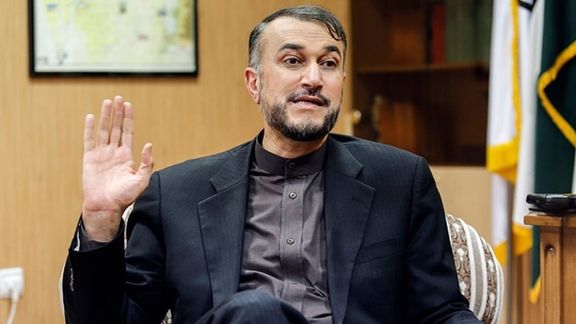
Iran’s foreign minister has said talks aimed at reviving the 2015 nuclear agreement resume in Vienna based on a "new document" replacing a preliminary draft from June.
“We have put aside the June 2021 document, and negotiations on a joint document will commence as of today,” Hossein Amir-Abdollahian told reporters on the side-lines of a conference in Tehran. He described the new document as "mutually acceptable" and that it included issues related to both the Iran’s nuclear program and sanctions.
There has been speculation over the status of written proposals submitted by Iran at the beginning of December and how these might relate to discussions in Vienna that were suspended in June pending the Iranian presidential election and transition. Some Western diplomats have insisted that a draft from June remained the basis on which negotiators had to continue talks on restoring the 2015 agreement, the JCPOA (Joint Comprehensive Plan of Action).
Mikhail Ulyanov, Russia’s lead negotiator in the talks, tweeted Sunday, reacting to Iranian journalist Abas Aslani that “having agreed on modality and agenda…we’ll now enter discussions on content,” that “to the best of my knowledge all the other participants in the Vienna talks on JCPOA proceed from similar understandings.”
Ulyanov also tweeted a timeline showing the effect of the US 2018 decision to leave the JCPOA and impose ‘maximum pressure’ sanctions on Iran, as “one day to destroy what took years to build & to cause more years of damage control.”
Amir-Abdollahian emphasized the importance to Iran of “guarantees and verification,” which he said would be on the agenda. The foreign minister stressed Iran needed to know it would be able to sell oil and receive payments in foreign currencies, which had been blocked under ‘maximum pressure’ US sanctions threating punitive actions against third parties. "We should be able to enjoy all the economic benefits [of the JCPOA] in various sectors,” Amir-Abdollahian said.
Stressing that Iranian negotiators would remain in the Austrian capital as long as required, a source close to the Iranian negotiation team told the official news agency IRNA Sunday that the previous round of talks had been focused on "general issues" whereas the eighth round would center on the contents of a potential agreement. "Now it's the opposite sides' turn to show their good will on the matter of the sanctions, progress in the future round hinges on the approach adopted by the other parties,” the source said.
In apparent reference to US Secretary of State Antony Blinken and White House Iran envoy Robert Malley's warnings last week that time was running out to renew the JCPOA, the source said Iranian negotiators would not accept "factitious deadlines” and that Iran felt “no urgency” in concluding the talks.
Malley told CNN December 21 that “we have some weeks left but not much more than that." Asked if Iran was “playing for time,” he replied: "If it's their plan, I strongly urge them to revisit it."
Malley claimed Iran was “nearing the capability” to develop a nuclear weapon through expanding its nuclear program, referring to steps taken since 2019, the year after the US quit the JCPOA. Malley said that within weeks there would be no deal to be revived and "a period of escalating crisis" would follow.
Blinken spoke Tuesday of a window rapidly closing. "It's getting very, very short,” he said. “Being able to recover full benefits of JCPOA, by [presumably Tehran] returning to compliance with it, is getting increasingly problematic by advances that Iran makes every single day in its nuclear program."
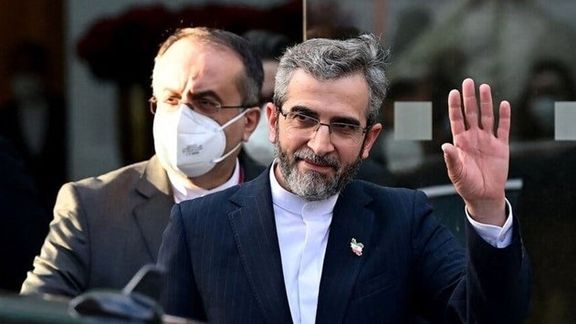
Iran's negotiation team has arrived in the Austrian capital Vienna to resume talks with world powers over the country’s nuclear program.
Chief negotiator Ali Bagheri-Kani and his accompanying delegation will soon go to Palais Coburg to hold diplomatic consultations ahead of a meeting of the JCPOA Joint Commission.
During the fresh round of talks that will kick off Monday afternoon, the sides are expected to discuss the contents of a new text and the possible roadmap for revival of the July 2015 nuclear deal.
Iranian Foreign Minister Hossein Amir-Abdollahian said on Monday morning that this round of talks will focus on a new joint draft, adding, “Today we have an acceptable joint document on the table”.
He noted that the most important issue in the new document is achieving proper guaranties that Iran can sell its oil easily and without any restrictions as well as receiving the proceeds in foreign currency in Iranian banks.
In addition to US sanctions on Iran’s oil exports, there are also banking sanctions that have cut off most of Tehran’s financial ties with the world.
Bagheri-Kani said earlier that if the other sides accept the Islamic Republic’s demands, the eighth round could be the final round.
Many Iranian pundits have expressed doubt about the success of this round in achieving tangible results.